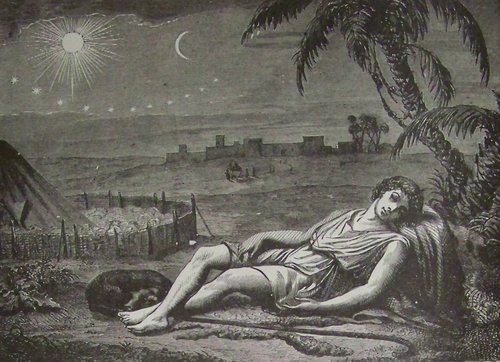It was really for the sake of saving lives that God sent me here ahead of you. (Genesis 45:5)
Let’s talk about how to read the signs. God gives us signs regarding His will, His intentions, His plans. But how to read them? Joseph with the beautiful tunic can teach us.
Everyone know what happened between Joseph and his brothers?
When Joseph was young, his brothers treated him with shameful contempt. Joseph had charm and creativity, and he delighted his father. So his brothers despised him out of jealousy. They planned to kill him, but in the end sold him into slavery in Egypt.
 But Joseph’s fortunes rose while his brothers’ fell. Joseph became chief steward of Pharaoh’s enormous kingdom. Meanwhile, Joseph’s brothers suffered through an extended famine.
But Joseph’s fortunes rose while his brothers’ fell. Joseph became chief steward of Pharaoh’s enormous kingdom. Meanwhile, Joseph’s brothers suffered through an extended famine.
How, though, did Joseph understand all these twists and turns of fate? Let’s imagine him sitting in his silken robes as master of the Egyptian dispensary. He sees his emaciated brothers shuffle in, begging for food. We could hardly blame Joseph if he thought to himself at that moment: Well, looky here. Look at the tough guys. They hated me for no good reason. Now they are paying the piper, and I am in the driver’s seat. Revenge really is a dish that is best served cold.
Who could blame Joseph if he had thought along those lines? But he did not think that way at all. To the contrary, he never gave a moment’s thought to revenge; it didn’t even occur to him.
All Joseph could think about was the hunger of his family. He promptly and quietly saw to it that his brothers received plenty of grain. The same brothers who threw him in the cistern and sold him into slavery.
In fact, not only did Joseph completely ignore his opportunity for sweet revenge—he even went further in the way he read the signs. A smaller person could easily have seen the hand of a vengeful God at work in the sufferings of his brothers. In point of fact, the brothers themselves read the signs that way, interpreting their suffering as punishment for their injustice to Joseph. But Joseph saw the opposite.
 Joseph did not say to himself, Aha! God has justly punished these evil brothers of mine and put them into my power! Rather, he said: Aha! God has led me through all the trials and tribulations of my difficult, lonely life for one reason: so that I could help my brothers now and save them from starvation. A smaller person would have seen the hand of a vengeful God at work in his brothers’ sufferings. But Joseph saw the hand of a merciful God at work in his own sufferings.
Joseph did not say to himself, Aha! God has justly punished these evil brothers of mine and put them into my power! Rather, he said: Aha! God has led me through all the trials and tribulations of my difficult, lonely life for one reason: so that I could help my brothers now and save them from starvation. A smaller person would have seen the hand of a vengeful God at work in his brothers’ sufferings. But Joseph saw the hand of a merciful God at work in his own sufferings.
This, I think, is the way to read the signs. Joseph knew God better than his brothers did. God does not move events for the sake of my own personal satisfaction; He moves them so that He may satisfy the needs of others through me. The universe does not revolve around me; my universe revolves around the people who need my help.
May Joseph be a sign for us. Scripture teaches us that all things work for the good of those who love God. All things work for our good—when we understand that our true good is really the good of our neighbors. So let’s put it Joseph’s way: All things work for the good of the people that the people who love God love.
 But Joseph’s fortunes rose while his brothers’ fell. Joseph became chief steward of Pharaoh’s enormous kingdom. Meanwhile, Joseph’s brothers suffered through an extended famine.
But Joseph’s fortunes rose while his brothers’ fell. Joseph became chief steward of Pharaoh’s enormous kingdom. Meanwhile, Joseph’s brothers suffered through an extended famine. Joseph did not say to himself, Aha! God has justly punished these evil brothers of mine and put them into my power! Rather, he said: Aha! God has led me through all the trials and tribulations of my difficult, lonely life for one reason: so that I could help my brothers now and save them from starvation. A smaller person would have seen the hand of a vengeful God at work in his brothers’ sufferings. But Joseph saw the hand of a merciful God at work in his own sufferings.
Joseph did not say to himself, Aha! God has justly punished these evil brothers of mine and put them into my power! Rather, he said: Aha! God has led me through all the trials and tribulations of my difficult, lonely life for one reason: so that I could help my brothers now and save them from starvation. A smaller person would have seen the hand of a vengeful God at work in his brothers’ sufferings. But Joseph saw the hand of a merciful God at work in his own sufferings.
 1)
1)  2) Environmentalist Pope Benedict says no to “gender ideology”:
2) Environmentalist Pope Benedict says no to “gender ideology”: